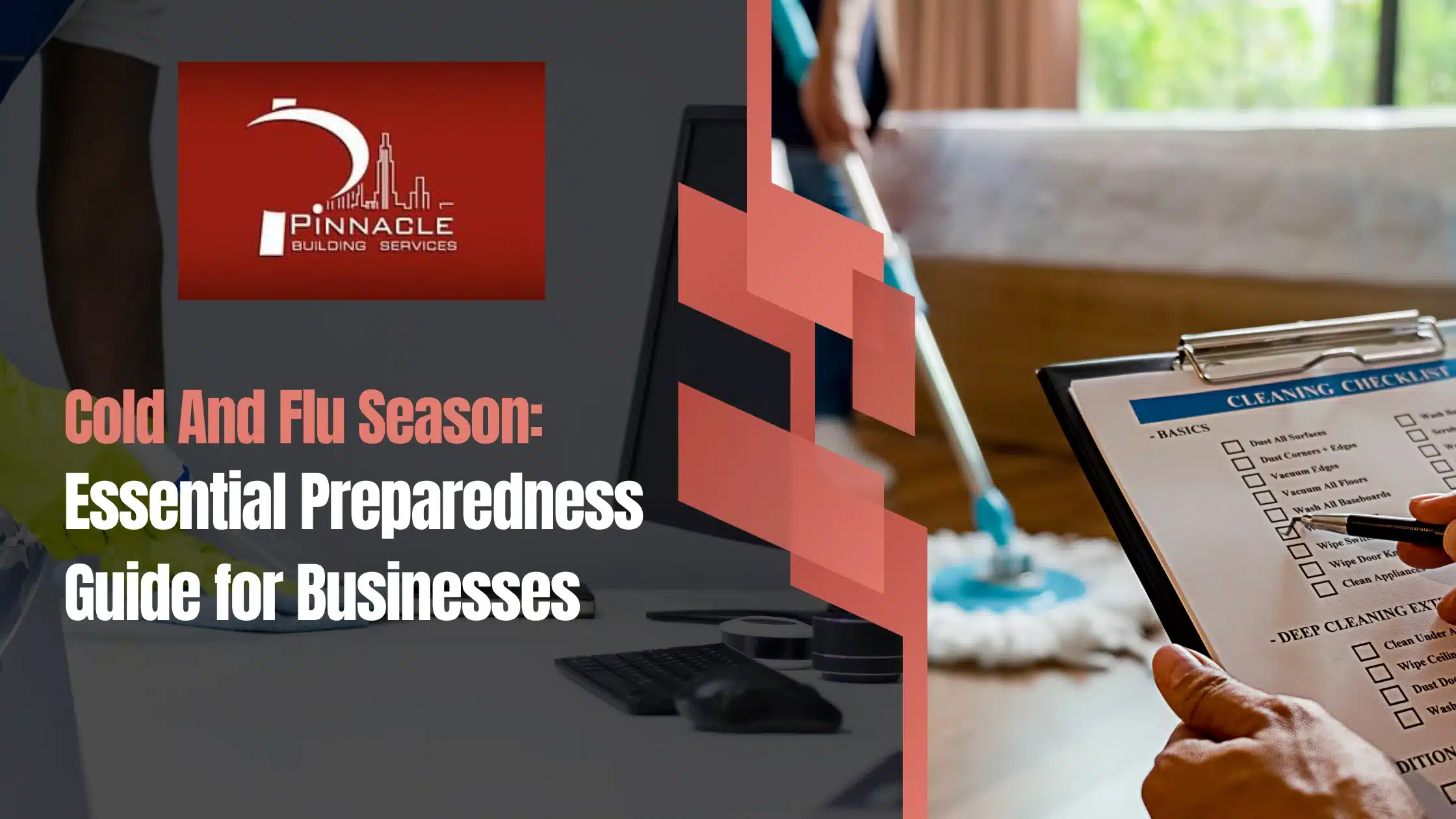As the leaves turn and the days shorten, employers face a familiar adversary: cold and flu season. Every year, waves of sneezes and coughs signal a battle against workplace illness that can knock productivity off course. A well-stocked toolkit of proactive measures is not just wise but essential to keep your team healthy and operations smooth. Tips that blend common sense with savvy prevention—from recognizing early signs to encouraging people to stay home—can curb the spread before it starts. When everyone takes part, from interns to CEOs, you create a fortress against seasonal disease outbreaks, ensuring this year’s impact is as mild as autumn’s first chill.
Key Takeaways
Stay Informed: Businesses should keep abreast of local health advisories during cold and flu season to adjust their response plans accordingly.
Plan Ahead: Develop a comprehensive response plan that includes infection control measures, social distancing policies, and deep cleaning protocols.
Promote Wellness: Encourage employees to maintain their health through vaccinations, proper nutrition, and regular exercise to minimize the impact of cold and flu.
Educate Employees: Regularly educate your workforce on the importance of hygiene, recognizing symptoms, and when to stay home to prevent spreading illness.
Implement Preventative Measures: Adopt infection control practices such as frequent handwashing, use of masks, and availability of sanitizers throughout the workplace.
Foster a Supportive Culture: Create an environment that supports employees in taking responsible actions, such as staying home when sick, without fear of repercussions.
Understanding Cold and Flu Season Risks
Workplace Vulnerability
Businesses must recognize where germs hide. High-risk areas like shared spaces can spread illness fast. Think about door handles, keyboards, and break rooms. These spots need regular cleaning.
Employees can get sick easily during flu season. People close together means germs pass quickly from one to another. A single sneeze can start a chain reaction of colds or the flu.
When workers fall ill, it costs companies money. Sick days mean less work gets done. It also affects how happy and focused employees are at work.
Remote Workforce Challenges
Even remote workers face challenges during cold and flu seasons. They might not have easy access to health resources like nearby clinics or pharmacies.
Talking with team members who are spread out is harder too. Without face-to-face meetings, sharing important health updates becomes tricky.
If many people get sick at once, keeping up productivity is tough for businesses with remote teams as well as those in offices.
Business Continuity Planning
It’s smart for businesses to plan for times when lots of employees might be out sick. Here’s what they should do:
Create a backup plan if staff numbers drop.
Teach different skills so more than one person knows how to do important jobs.
Make sure there’s a way to let everyone know about emergencies quickly and clearly.
Having these steps in place helps keep things running smoothly even when the common cold or influenza hits hard.
Developing a Response Plan
Pandemic Preparedness
Businesses must have a pandemic response plan. This is to keep everyone safe. It means getting ready before sickness spreads. Companies should stock up on things like masks and hand sanitizer.
It’s also smart to talk with local health experts. They give advice about what to do if many people get sick at once.
Vaccination Strategies
One way businesses can help is by having vaccine clinics at work. This makes it easy for workers to get their shots against flu or other illnesses.
Businesses should tell employees why vaccines are good for them. Sometimes, they offer little rewards for getting vaccinated too.
Sick Leave Policies
Companies need good rules about staying home when sick. These rules make sure that workers don’t feel they have to come in if they’re not feeling well.
Sometimes, during cold and flu season, businesses might change these rules a bit, so more people can stay home and get better without worry.
Promoting Employee Health
Encouraging Vaccinations
Businesses can play a key role in employee health during cold and flu season. One effective way is by promoting vaccinations. Companies should educate their staff on how vaccines work to prevent the flu. This includes sharing success stories of reduced sick days due to vaccination.
To tackle vaccine hesitancy, businesses need to address common myths. It’s crucial to provide clear facts about vaccine safety and effectiveness. A company-supported vaccination program could offer free or discounted shots at the workplace.
Prioritizing Handwashing
Another essential step is prioritizing hand hygiene. Signs around sinks can remind employees to wash hands regularly. These signs might show the steps for thorough cleaning with soap and water.
Workplaces should have hand sanitizers available for everyone’s use, especially where there’s no immediate access to a sink. During team meetings, managers can take a moment to demonstrate proper handwashing techniques as well.
Cough Etiquette
Cough etiquette is vital in keeping workplaces healthy during flu season. Education on this topic helps reduce the spread of germs via airborne droplets from coughs or sneezes.
Companies should supply tissues throughout office spaces along with no-touch trash bins for disposal after use. Also, reinforcing cough etiquette in shared areas like meeting rooms and cafeterias ensures that all employees are mindful of their actions.

Infection Control Measures
Sanitizing Practices
Businesses must keep workplaces clean to fight colds and flu. Use EPA-approved disinfectants. These kill most viruses on surfaces. Teach staff how to sanitize properly. They should wear gloves and wash hands after cleaning.
Sanitize things people touch a lot, like phones and keyboards, often. This stops germs from spreading.
Office Cleaning Schedules
More cleaning is key during flu season. Clean the office more times each day. Put up a cleaning schedule so everyone can see it. This shows workers when and what needs cleaning.
Give different tasks to different people for safety. This helps avoid mixing chemicals or tools that could spread germs instead of killing them.
Ventilation Systems
Good air flow keeps offices healthy too. Check HVAC systems often, especially filters, to make sure they work right and trap dust and germs well.
Open windows if you can for fresh air in the office space which helps clear out germs in the air. In busy areas, think about getting better filters or air purifiers for cleaner breathing air.
Social Distancing and Masks
Implementing Policies
Businesses must write down illness prevention rules. They should tell all workers about the new rules. It’s important to apply these rules the same way for everyone.
To keep people safe, businesses can:
Make sure everyone knows to stay home if they feel sick.
Tell workers how far apart they should be from each other.
Explain when and where to wear masks.
Rules work best when everyone understands them.
Managing Office Layouts
Changing how desks are set up helps keep employees safe. Putting up plastic screens between work areas is another good idea. This stops germs from spreading through the air.
In tight spaces, allow fewer people at once. Here are ways to rearrange offices:
Move desks further apart.
Put barriers around each desk area.
Limit how many people can go into small meeting rooms.
These changes help stop colds and flu at work.
Handling Common Areas
During busy sickness seasons, it might be smart not to use places like kitchens or lounges at work. If you need those spaces, try not having too many people there at one time.
Here’s what businesses can do:
Close off break rooms when lots of people are getting sick.
Have different times for breaks so not everybody goes at once.
Stop using things that many hands touch, like coffee machines or microwaves if needed.
This reduces the chance of catching something from someone else in shared spots.
Deep Cleaning Protocols
Janitorial Services
Businesses must work closely with janitorial staff during cold and flu season. It’s important to have a team that knows how to clean well. They should understand which cleaning methods keep germs away best. Staff need training on health safety standards too.
New cleaning tools or solutions might be needed. Health experts often give advice on the best ones to use. Businesses should listen and make changes if they say so.
High-Touch Surfaces
Some parts of an office get touched a lot, like doorknobs and light switches. These spots can spread germs quickly if not cleaned often. It’s smart to figure out where these high-touch surfaces are in your business.
Once you know, you can put stickers or signs there as reminders. This helps everyone remember to clean them more and be careful when touching them.
You also need things like wipes and sprays ready for keeping these areas germ-free all the time.
Cleaning Frequency
How often should we clean? That depends on how many people come into your space and what kind of surfaces you have. During cold and flu season, it’s good to clean more than usual because more germs are around then.
Keep track of how well the new cleaning plan is working too. If lots of people are getting sick locally, it might mean you need to clean even more often than planned.
By setting up strong deep cleaning protocols, businesses can help stop the spread of colds and flus among their teams. It takes effort from everyone—bosses, cleaners, employees—to make sure our workplaces stay safe during this tricky time. With good planning now, we can all breathe easier later knowing we did our part!
Educating the Workforce
Prevention Information
Businesses can help workers stay healthy during cold and flu season. Educational materials are key. Companies should distribute them to everyone. This includes flyers about hand washing and avoiding germs. It’s also smart to host sessions on health. They could be webinars or in-person meetings.
Another good idea is using company newsletters for tips. Workers can learn how to prevent sickness this way. Bulletin boards are useful too. They can show how to stop germs from spreading at work.
Health Resources Sharing
It’s important for businesses to share health resources with their workers. A list of local healthcare places helps a lot. This list might have doctors, pharmacies, and places where you can get tested for the flu.
Updates from health organizations keep everyone informed about colds and flus going around town.
Telehealth services are great too! They let workers talk to a doctor without leaving home or work.
Communication Channels
Having special ways to talk about health at work is helpful during flu season. Emails or an intranet site could be used just for sharing news about staying healthy. Open talks between bosses and workers make it easier for people to share worries about getting sick. Technology like apps or websites lets everyone know what’s happening right away if there’s a big concern at work like many people getting sick all at once.

Maintaining a Healthy Environment
Monitoring Health
Businesses must watch health trends closely. They should track how many workers stay home because of colds or the flu. This shows if sickness is going up in their place.
Health departments send out warnings when more people get sick locally. Companies need to pay attention to these alerts. It helps them be ready for more workers getting ill.
Businesses can ask employees how they feel often, maybe with a quick form or meeting. Knowing this helps companies understand when and where illness might happen.
Wellness Resources
It’s good for businesses to help keep their workers healthy during cold and flu season. One way is by giving shots against the flu for free or at a lower cost.
Workers may also get vitamins as part of what the company gives them. These can help stop people from getting sick.
Stress makes it easier to get sick, so teaching about managing stress is important too. Workshops on handling stress can make workers’ bodies stronger against illness.
Adjusting Workloads
Sometimes there are not enough workers because many are out sick at the same time. Businesses should think about this when setting deadlines for projects.
They might pick tasks that don’t need much teamwork if they expect some people will be away from work due to sickness.
When lots of people tend to get sick, like in winter, it’s helpful if bosses let deadlines be flexible where possible.
Keeping an office healthy means thinking ahead and being careful with planning work and supporting employees’ health needs throughout the year but especially during cold and flu season.
Encouraging Responsible Behavior
Stay-at-Home Enforcement
Businesses must set clear rules for when employees should stay home. If someone has a cough or fever, they need to work from home. This keeps everyone safe.
Companies should be okay with people working from home even if they just feel a little sick. It’s better to be safe than sorry.
It’s not good when people try to work while they’re sick. They might think they’re being tough, but it can make others sick too.
Self-Care Encouragement
When workers get sick, bosses should remind them about taking care of themselves. Resting and drinking lots of water are very important.
Sometimes it’s hard to know when you need a doctor or just some time off at home. Bosses should help by giving tips on what to do in both situations.
Taking care of your mind is as important as taking care of your body. Businesses can tell their workers that it’s okay to take days off for mental health too.
Supporting Recovery Time
Getting back to 100% after being ill takes time. Companies shouldn’t rush their workers back too soon.
If someone needs more days off after getting better, bosses shouldn’t make them feel bad about it. Everyone heals at different speeds and businesses need to remember that.
Being flexible with recovery times shows that the company cares about its employees’ well-being.
Conclusion
As we’ve navigated the twists and turns of cold and flu season, it’s clear that a stitch in time saves nine. You’ve got the lowdown on dodging the sniffles and sneezes at work. We talked about gearing up with a solid game plan, keeping your crew in fighting shape, and making your workspace a no-fly zone for germs. It’s all about playing it smart and staying one step ahead.
So, what’s next? Roll up your sleeves and make these tips your playbook. Keep those hand sanitizers handy, masks at the ready, and eyes on the ball for a healthy team. Your business is counting on you to lead the charge against colds and flu. Let’s knock it out of the park together! Ready to take action? Share this guide with your team today and let’s win this season!
Frequently Asked Questions
How can businesses prepare for cold and flu season?
Businesses should develop a response plan, promote employee health, and implement infection control measures like social distancing, masks, and deep cleaning protocols.
What are some effective influenza infection control measures for the workplace that employers can implement using a SHRM toolkit?
Regular handwashing, use of sanitizers, routine surface disinfection, and encouraging sick employees to stay home are key strategies.
Should employers enforce a social distancing policy during cold, flu, and influenza season?
Yes. Maintaining distance between individuals can help reduce the spread of respiratory illnesses in the workplace.
Why is educating the workforce important for employers in preventing common cold and fever spread?
Informed employees can better adhere to policies designed to keep themselves and their coworkers healthy during cold and flu season.
How often should employers ensure workplaces undergo deep cleaning during peak fever sickness seasons?
It's wise to increase cleaning frequency during high-risk periods. Focus on high-touch areas daily or multiple times per day if possible.
Can promoting employee health by employers actually reduce absenteeism due to colds, flus, and fever?
Absolutely! Encouraging vaccinations, good nutrition, regular exercise, and adequate sleep helps strengthen immune systems against common viruses.




